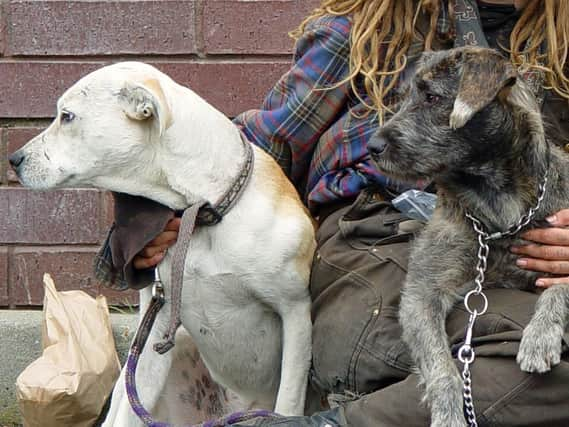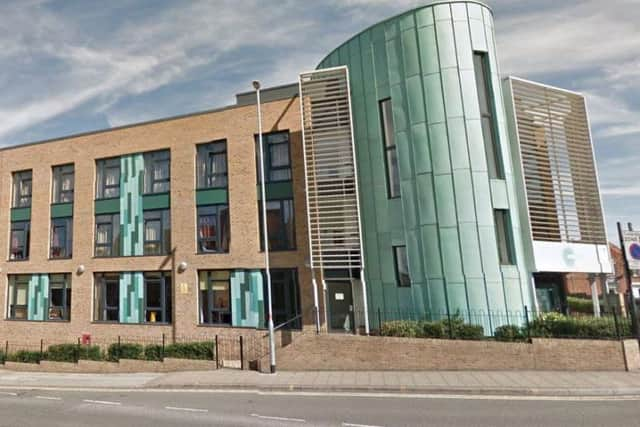FEATURE: The barriers between Northampton's homeless and the health care they need examined in new report


So what other needs fall to the wayside over time? What do they do if their feet get infected, or mental health issues take root, or their dependence on alcohol gets greater and greater?
An employed, safely-homed person would go to their GP. But homeless people do not trust GPs.
Advertisement
Hide AdAdvertisement
Hide AdThere are an estimated 39 people sleeping rough in Northamptonshire, with an estimated 15 of which in Northampton. This does not include the 'secret homeless' who are unemployed, sofa surfing or living in unsecured accommodation with friends and family.


A new study by Healthwatch Northamptonshire spoke to 25 people who were recently homeless to ask what rough sleepers do when they need help getting healthy. They found many choose to do nothing. Or rather, they feel there are barriers between them and the help them need, so they do not even try.
The report lists malnourishment, rotten teeth, bowel issues, trench foot and mental health issues as common problems for homeless people seeking health care.
It states: "Homelessness is a complex issue with each person presenting with both common and unique experiences of what it is like to be homeless. There is no 'one size fits all' provision of health and social care.
Advertisement
Hide AdAdvertisement
Hide Ad"From talking to homeless people we have heard some basic needs to be considered when thinking about good health in homeless people. Rather than wanting better access to services such as GPs and dentists, homeless people prioritise their more immediate needs, such as having warm, dry socks and having their feet attended to."


Access to GPs is not always the issue. Many in the focus groups said they were still registered at their practices. They just do not feel their doctors would understand their lives and the issues they face.
The Maple Access Partnership Surgery, in Northampton, was set up 16 years ago to help deal with the specialist needs of homeless people.
Dr Mahesh Dias, lead GP at the surgery, said: "It's about giving them that accessibility. Most GPs just don't provide what they need. For example, many homeless people do not have mobile phones, and if they do, they don't have credit. When they call us, we get the main details in under a minute, and then call them back to save their money.
Advertisement
Hide AdAdvertisement
Hide Ad"We don't ask for proof of address, but they still need to be registered. But we have homeless patients coming to us from across the county."
Access to mental health services is even harder. Approximately 70 per cent of the homeless people in the study claimed they had experienced a mental health condition. While charities like the Northampton Hope Centre offer help, the prolonged therapy and medication often needed to treat mental health issues are hard to access.
But a common problem in accessing mental health care is alcohol. Many homeless people use it to cope with their circumstances. The report states how "the use of alcohol is hard to avoid but can be a barrier to people accessing mental health services and support, due to professionals not understanding how the two are linked."
One homeless person said in the study: "We are not seen as a whole person. We are told our drink problem must be addressed before we move on to mental health services when we feel that both our mental health and our alcohol addiction are intertwined."
Advertisement
Hide AdAdvertisement
Hide AdThe focus group also talked about a "perpetual cycle" that deteriorates mental health. A client is discharged from a psychiatric hospital to a night shelter. With no briefing on the client's condition, the night shelter is unable to manage their behaviour, and they are sent back to hospital. From there, the hospital could refuse to admit the patient, and they are discharged back onto the street. Occassionally, the hospital involve the police.
Dr Dias said: "Many homeless patients I speak to have had bad experiences. They get assaulted and have their prescriptions stolen. Young women get abused. They can be addicted to drugs and alcohol. These people don't want to speak about their problems and they keep it to themselves. This grows and grows inside them until they are unable to cope.
"After a person becomes homeless, the Northampton Borough Council must do everything they can to get them into housing as soon as possible. If they leave it too late, their mental health problems can grow until they are unable to resume their lives anymore."
All these issues contribute to an increased risk of death. Te report states that: "The average age of death from homeless person is 47 years old. Young homeless people (16-24) are twice as likely to die as their contemporaries and this increases to four to five times for 25-34 year olds and five to six times for 25-44 year olds.
Advertisement
Hide AdAdvertisement
Hide Ad"Understanding the culture and nature of homelessness along with the challenges faced by homeless people and the organisations that support them has been a vital part of understanding what health and social care provision homeless people need and the barriers they face every day."